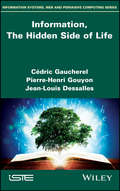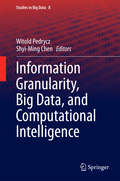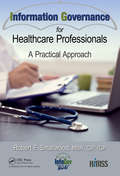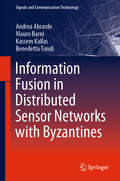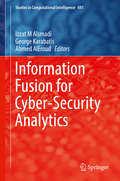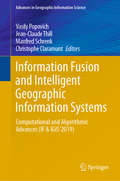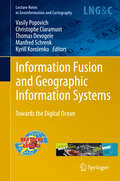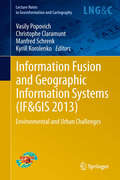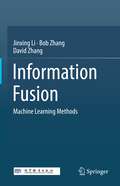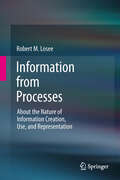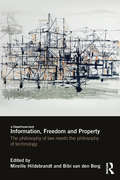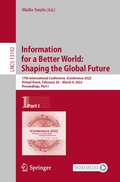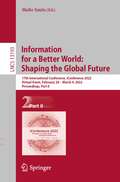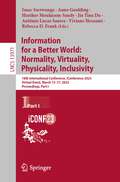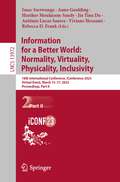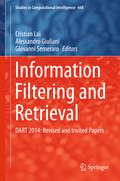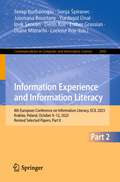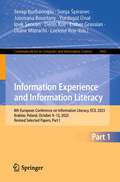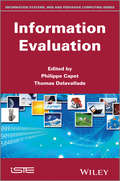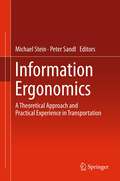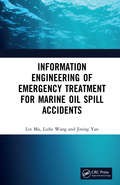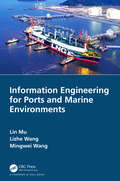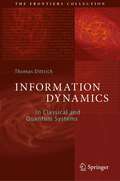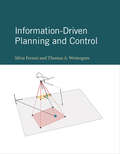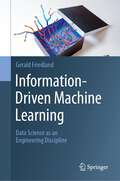- Table View
- List View
Information, The Hidden Side of Life
by Cédric Gaucherel Pierre-Henri Gouyon Jean-Louis DessallesThis book explores the unity of life. It proposes that the concept of information is the inner essence of what we today call life. The importance of information for our species is obvious. Human beings are highly dependent on information, constantly exchanging with conspecifics. In a less apparent way, we are the product of genetic and epigenetic information which determines our development in a given environment from a fertilized egg to the adult stage. Even less apparent is that information plays a determining role in ecosystems. This observation may include the prebiotic systems in which life emerged. Our claim is that Nature processes information continuously. This means that even beyond living entities, we can see messages and decoding procedures. Nature can be said to send messages to its own future and then to decode them. Nature “talks” to itself! The systematic organization of messages suggests that, in some respects, we should even speak of the “languages” of Nature.
Information Granularity, Big Data, and Computational Intelligence
by Witold Pedrycz Shyi-Ming ChenThe recent pursuits emerging in the realm of big data processing, interpretation, collection and organization have emerged in numerous sectors including business, industry and government organizations. Data sets such as customer transactions for a mega-retailer, weather monitoring, intelligence gathering, quickly outpace the capacities of traditional techniques and tools of data analysis. The 3V (volume, variability and velocity) challenges led to the emergence of new techniques and tools in data visualization, acquisition, and serialization. Soft Computing being regarded as a plethora of technologies of fuzzy sets (or Granular Computing), neurocomputing and evolutionary optimization brings forward a number of unique features that might be instrumental to the development of concepts and algorithms to deal with big data. This carefully edited volume provides the reader with an updated, in-depth material on the emerging principles, conceptual underpinnings, algorithms and practice of Computational Intelligence in the realization of concepts and implementation of big data architectures, analysis, and interpretation as well as data analytics. The book is aimed at a broad audience of researchers and practitioners including those active in various disciplines in which big data, their analysis and optimization are of genuine relevance. One focal point is the systematic exposure of the concepts, design methodology, and detailed algorithms. In general, the volume adheres to the top-down strategy starting with the concepts and motivation and then proceeding with the detailed design that materializes in specific algorithms and representative applications. The material is self-contained and provides the reader with all necessary prerequisites and augments some parts with a step-by-step explanation of more advanced concepts supported by a significant amount of illustrative numeric material and some application scenarios to motivate the reader and make some abstract concepts more tangible.
Information Governance for Healthcare Professionals: A Practical Approach (HIMSS Book Series)
by Robert F. SmallwoodLike other critical organizational assets, information is a strategic asset that requires high level of oversight in order to be able to effectively use it for organizational decision-making, performance improvement, cost management, and risk mitigation. Adopting an information governance program shows a healthcare organization’s commitment to managing its information as a valued strategic asset. Information governance serves the dual purpose of optimizing the ability to extract clinical and business value from healthcare information while meeting compliance needs and mitigating risk. Healthcare organizations that have information governance programs will have a competitive edge over others and contributes to safety and quality of care, population health, operational efficiency and effectiveness, and cost reduction initiatives. This is a much-needed book in the healthcare market space. It will explain, in clear terms, how to develop, launch, and oversee an Information Governance program. It also provides advice and insights from leading IG, cybersecurity and information privacy professionals in healthcare.
Information Fusion in Distributed Sensor Networks with Byzantines (Signals and Communication Technology)
by Andrea Abrardo Mauro Barni Kassem Kallas Benedetta TondiThis book reviews the most powerful attack strategies and potential defense mechanisms, always approaching the interplay between the Fusion Center and the Byzantines from a game-theoretic perspective. For each of the settings considered, the equilibria of the game and the corresponding payoffs are derived, shedding new light on the achievable performance level and the impact that the presence of the Byzantines has on the accuracy of decisions made by the Fusion Center. Accordingly, the book offers a simple yet effective introduction to the emerging field of adversarial information fusion, providing a wealth of intuitive take-home lessons for practitioners interested in applying the most basic notions to the design of practical systems, while at the same time introducing researchers and other readers to the mathematical details behind the theory.
Information Fusion for Cyber-Security Analytics
by Izzat M. Alsmadi George Karabatis Ahmed AleroudThis book highlights several gaps that have not been addressed in existing cyber security research. It first discusses the recent attack prediction techniques that utilize one or more aspects of information to create attack prediction models. The second part is dedicated to new trends on information fusion and their applicability to cyber security; in particular, graph data analytics for cyber security, unwanted traffic detection and control based on trust management software defined networks, security in wireless sensor networks & their applications, and emerging trends in security system design using the concept of social behavioral biometric. The book guides the design of new commercialized tools that can be introduced to improve the accuracy of existing attack prediction models. Furthermore, the book advances the use of Knowledge-based Intrusion Detection Systems (IDS) to complement existing IDS technologies. It is aimed towards cyber security researchers.
Information Fusion and Intelligent Geographic Information Systems: Computational and Algorithmic Advances (IF & IGIS’2019) (Advances in Geographic Information Science)
by Vasily Popovich Jean-Claude Thill Manfred Schrenk Christophe ClaramuntThis book gathers the proceedings of the 9th International Symposium “Information Fusion and Intelligent Geographic Information Systems 2019” (IF&IGIS'2019), which was held in St. Petersburg, Russia from May 22 to 24, 2019. The goal of the symposium was to provide a forum for exchange among leading international scholars in the fields of spatial data, information integration and Intelligent Geographic Information Systems (IGIS). The symposium was an opportunity to discuss sound and effective lines of modeling in the fusion of spatial data and information within the broader scope of intelligent GIS. The topics of the 2019 Symposium essentially fall into three broad categories of developments aimed at leveraging the power of spatial information, namely: artificial intelligence; algorithmic and computations processes; and data-informed simulation models. All papers collected here present compelling, cutting-edge research on cloud computing, deep learning, visual analytics, and large-scale optimization. They discuss information fusion and intelligent GIS research in the context of surface and sub-surface maritime activities, port asset management, land-based trip and travel planning, smart city and e-government, emergency management, and environmental monitoring. Given its scope, the book will be of interest to students, researchers and professionals working in GIS, remote sensing, and cloud computing.
Information Fusion and Geographic Information Systems
by Christophe Claramunt Thomas Devogele Kyrill Korolenko Vasily V. Popovich Manfred SchrenkThe Workshop Proceedings reflect problems of advanced geo-information science as far as they are specifically concerned with the maritime environment at large. The Proceedings incorporate papers presented by leading scientists researching in the considered professional area and by practitioners engaged in GIS and GIS applications development. They pay close attention to the problems of scientific and technological innovations and the ensuing opportunities to make seas safer and cleaner. Furthermore, they periodically measure the ground covered and new challenges with respect to economic and shipping trends as related to Artificial Intelligence; GIS ontologies; GIS data integration and modelling; Underwater acoustics; GIS data fusion; GIS and corporate information systems; GIS and real-time monitoring systems; GIS algorithms and computational issues; Novel and emerging marine GIS research areas; Monitoring of maritime terrorist threat; Maritime and environmental GIS; Navigation-based and maritime transportation GIS; Human factors in maritime GIS; Coastal and environmental GIS.
Information Fusion and Geographic Information Systems (IF AND GIS #2013)
by Vasily Popovich Christophe Claramunt Manfred Schrenk Kyrill KorolenkoThe Workshop Proceedings reflect problems of advanced geo-information science with a special emphasis on environmental and urban challenges. The Proceedings incorporate papers presented by leading scientists doing research on environmental issues from modeling to analysis, information processing and visualization. As well as practitioners engaged in GIS and GIS applications development. The Proceedings pay close attention to the problems of scientific and technological innovations as well application opportunities such as getting environmental and global warming problems under control, as well as the monitoring, planning and simulation of urban systems with respect to economic trends as related to: Artificial intelligence; GIS ontologies; GIS data integration and modeling; Environmental management ; Urban GIS; Transportation GIS; GIS data fusion; GIS and corporate information systems; GIS and real-time monitoring systems; GIS algorithms and computational issues; Landscape studies; Global warming; GIS and the Arctic sea; Novel and emerging GIS research areas; Maritime and environmental GIS; and Coastal GIS.
Information Fusion: Machine Learning Methods
by Jinxing Li Bob Zhang David ZhangIn the big data era, increasing information can be extracted from the same source object or scene. For instance, a person can be verified based on their fingerprint, palm print, or iris information, and a given image can be represented by various types of features, including its texture, color, shape, etc. These multiple types of data extracted from a single object are called multi-view, multi-modal or multi-feature data. Many works have demonstrated that the utilization of all available information at multiple abstraction levels (measurements, features, decisions) helps to obtain more complex, reliable and accurate information and to maximize performance in a range of applications.This book provides an overview of information fusion technologies, state-of-the-art techniques and their applications. It covers a variety of essential information fusion methods based on different techniques, including sparse/collaborative representation, kernel strategy, Bayesian models, metric learning, weight/classifier methods, and deep learning. The typical applications of these proposed fusion approaches are also presented, including image classification, domain adaptation, disease detection, image restoration, etc. This book will benefit all researchers, professionals and graduate students in the fields of computer vision, pattern recognition, biometrics applications, etc. Furthermore, it offers a valuable resource for interdisciplinary research.
Information from Processes
by Robert M. LoseeInformation is an important concept that is studied extensively across a range of disciplines, from the physical sciences to genetics to psychology to epistemology. Information continues to increase in importance, and the present age has been referred to as the "Information Age." One may understand information in a variety of ways. For some, information is found in facts that were previously unknown. For others, a fact must have some economic value to be considered information. Other people emphasize the movement through a communication channel from one location to another when describing information. In all of these instances, information is the set of characteristics of the output of a process. Yet Information has seldom been studied in a consistent way across different disciplines. Information from Processes provides a discipline-independent and precise presentation of both information and computing processes. Information concepts and phenomena are examined in an effort to understand them, given a hierarchy of information processes, where one process uses others. Research about processes and computing is applied to answer the question of what information can and cannot be produced, and to determine the nature of this information (theoretical information science). The book also presents some of the basic processes that are used in specific domains (applied information science), such as those that generate information in areas like reasoning, the evolution of informative systems, cryptography, knowledge, natural language, and the economic value of information. Written for researchers and graduate students in information science and related fields, Information from Processes details a unique information model independent from other concepts in computer or archival science, which is thus applicable to a wide range of domains. Combining theoretical and empirical methods as well as psychological, mathematical, philosophical, and economic techniques, Losee's book delivers a solid basis and starting point for future discussions and research about the creation and use of information.
Information, Freedom and Property: The Philosophy of Law Meets the Philosophy of Technology
by Mireille Hildebrandt Bibi van den BergThis book addresses issues on the nexus of freedom of and property in information, while acknowledging that both hiding and exposing information may affect our privacy. It inquires into the physics, the technologies, the business models, the governmental strategies and last but not least the legal frameworks concerning access, organisation and control of information. It debates whether it is in the very nature of information to be either free or monopolized, or both. Analysing upcoming power structures, new types of colonization and attempts to replace legal norms with techno-nudging, this book also presents the idea of an infra-ethics capable of pre-empting our pre-emption. It discusses the interrelations between open access, the hacker ethos, the personal data economy, and freedom of information, highlighting the ephemeral but pivotal role played by information in a data-driven society. This book is a must-read for those working on the contemporary dimensions of freedom of information, data protection, and intellectual property rights.
Information for a Better World: 17th International Conference, iConference 2022, Virtual Event, February 28 – March 4, 2022, Proceedings, Part I (Lecture Notes in Computer Science #13192)
by Malte SmitsThis two-volume set LNCS 13192 – 13193 constitutes the refereed proceedings of the 17th International Conference on Information for a Better World: Shaping the Global Future, held in February 2022. Due to COVID-19 pandemic the conference was held virtually. The 32 full papers and the 29 short papers presented in this volume were carefully reviewed and selected from 167 submissions. They cover topics such as: Library and Information Science; Information Governance and Ethics; Data Science; Human-Computer Interaction and Technology¸ Information Behaviour and Retrieval¸ Communities and Media¸ Health Informatics.
Information for a Better World: 17th International Conference, iConference 2022, Virtual Event, February 28 – March 4, 2022, Proceedings, Part II (Lecture Notes in Computer Science #13193)
by Malte SmitsThis two-volume set LNCS 13192-12193 constitutes the refereed proceedings of the 17th International Conference on Information for a Better World: Shaping the Global Future, held in February 2022. Due to COVID-19 pandemic the conference was held virtually. The 32 full papers and the 29 short papers presented in this volume were carefully reviewed and selected from 167 submissions. They cover topics such as: Library and Information Science; Information Governance and Ethics; Data Science; Human-Computer Interaction and Technology¸ Information Behaviour and Retrieval¸ Communities and Media¸ Health Informatics.
Information for a Better World: 18th International Conference, iConference 2023, Virtual Event, March 13–17, 2023, Proceedings, Part I (Lecture Notes in Computer Science #13971)
by Isaac Sserwanga Anne Goulding Heather Moulaison-Sandy Jia Tina Du António Lucas Soares Viviane Hessami Rebecca D. FrankThis two-volume set LNCS 13971 + 13972 constitutes the refereed proceedings of the 18th International Conference on Information for a Better World: Normality, Virtuality, Physicality, Inclusivity, held in March 2023.The 36 full papers and the 46 short papers presented in these proceedings were carefully reviewed and selected from 197 submissions. They cover topics such as: Archives and Records, Behavioral Research, Information Governance and Ethics, AI and Machine Learning, Data Science, Information and Digital literacy, Cultural Perspectives, Knowledge Management and Intellectual Capital, Social Media and Digital Networks, Libraries, Human-Computer Interaction and Technology, Information Retrieval, Community Informatics, and Digital Information Infrastructure.
Information for a Better World: 18th International Conference, iConference 2023, Virtual Event, March 13–17, 2023, Proceedings, Part II (Lecture Notes in Computer Science #13972)
by Isaac Sserwanga Anne Goulding Heather Moulaison-Sandy Jia Tina Du António Lucas Soares Viviane Hessami Rebecca D. FrankThis two-volume set LNCS 13971 + 13972 constitutes the refereed proceedings of the 18th International Conference on Information for a Better World: Normality, Virtuality, Physicality, Inclusivity, held in March 2023.The 36 full papers and the 46 short papers presented in these proceedings were carefully reviewed and selected from 197 submissions. They cover topics such as: Archives and Records, Behavioral Research, Information Governance and Ethics, AI and Machine Learning, Data Science, Information and Digital literacy, Cultural Perspectives, Knowledge Management and Intellectual Capital, Social Media and Digital Networks, Libraries, Human-Computer Interaction and Technology, Information Retrieval, Community Informatics, and Digital Information Infrastructure.
Information Filtering and Retrieval
by Cristian Lai Alessandro Giuliani Giovanni SemeraroThis book focuses on new research challenges in intelligent information filtering and retrieval. It collects invited chapters and extended research contributions from DART 2014 (the 8th International Workshop on Information Filtering and Retrieval), held in Pisa (Italy), on December 10, 2014, and co-hosted with the XIII AI*IA Symposium on Artificial Intelligence. The main focus of DART was to discuss and compare suitable novel solutions based on intelligent techniques and applied to real-world contexts. The chapters of this book present a comprehensive review of related works and the current state of the art. The contributions from both practitioners and researchers have been carefully reviewed by experts in the area, who also gave useful suggestions to improve the quality of the book.
Information Experience and Information Literacy: 8th European Conference on Information Literacy, ECIL 2023, Kraków, Poland, October 9–12, 2023, Revised Selected Papers, Part II (Communications in Computer and Information Science #2043)
by Serap Kurbanoğlu Sonja Špiranec Joumana Boustany Yurdagül Ünal İpek Şencan Denis Kos Esther Grassian Diane Mizrachi Loriene RoyThe two-volume set CCIS 2042 and 2043 constitutes the refereed proceedings of the 8th European Conference on Information Literacy, ECIL 2023, held in Kraków, Poland, in October 2023.The 47 full papers presented in these proceedings were carefully reviewed and selected from 182 submissions. The papers have been organized in the following topical sections: algorithms, artificial intelligence and information literacy; data literacy and digital literacy; information experience and information behaviour; policy, strategies, frameworks, research and different approaches; credibility, ethics, challenges and new paths; and information literacy instruction and education.
Information Experience and Information Literacy: 8th European Conference on Information Literacy, ECIL 2023, Kraków, Poland, October 9–12, 2023, Revised Selected Papers, Part I (Communications in Computer and Information Science #2042)
by Serap Kurbanoğlu Sonja Špiranec Joumana Boustany Yurdagül Ünal İpek Şencan Denis Kos Esther Grassian Diane Mizrachi Loriene RoyThe two-volume set CCIS 2042 and 2043 constitutes the refereed proceedings of the 8th European Conference on Information Literacy, ECIL 2023, held in Kraków, Poland, in October 2023.The 47 full papers presented in these proceedings were carefully reviewed and selected from 182 submissions. The papers have been organized in the following topical sections: algorithms, artificial intelligence and information literacy; data literacy and digital literacy; information experience and information behaviour; policy, strategies, frameworks, research and different approaches; credibility, ethics, challenges and new paths; and information literacy instruction and education.
Information Evaluation
by Philippe Capet Thomas DelavalladeDuring the reception of a piece of information, we are never passive. Depending on its origin and content, from our personal beliefs and convictions, we bestow upon this piece of information, spontaneously or after reflection, a certain amount of confidence. Too much confidence shows a degree of naivety, whereas an absolute lack of it condemns us as being paranoid. These two attitudes are symmetrically detrimental, not only to the proper perception of this information but also to its use. Beyond these two extremes, each person generally adopts an intermediate position when faced with the reception of information, depending on its provenance and credibility. We still need to understand and explain how these judgements are conceived, in what context and to what end. Spanning the approaches offered by philosophy, military intelligence, algorithmics and information science, this book presents the concepts of information and the confidence placed in it, the methods that militaries, the first to be aware of the need, have or should have adopted, tools to help them, and the prospects that they have opened up. Beyond the military context, the book reveals ways to evaluate information for the good of other fields such as economic intelligence, and, more globally, the informational monitoring by governments and businesses. Contents 1. Information: Philosophical Analysis and Strategic Applications, Mouhamadou El Hady Ba and Philippe Capet. 2. Epistemic Trust, Gloria Origgi. 3. The Fundamentals of Intelligence, Philippe Lemercier. 4. Information Evaluation in the Military Domain: Doctrines, Practices and Shortcomings, Philippe Capet and Adrien Revault d’Allonnes. 5. Multidimensional Approach to Reliability Evaluation of Information Sources, Frédéric Pichon, Christophe Labreuche, Bertrand Duqueroie and Thomas Delavallade. 6. Uncertainty of an Event and its Markers in Natural Language Processing, Mouhamadou El Hady Ba, Stéphanie Brizard, Tanneguy Dulong and Bénédicte Goujon. 7. Quantitative Information Evaluation: Modeling and Experimental Evaluation, Marie-Jeanne Lesot, Frédéric Pichon and Thomas Delavallade. 8. When Reported Information Is Second Hand, Laurence Cholvy. 9. An Architecture for the Evolution of Trust: Definition and Impact of the Necessary Dimensions of Opinion Making, Adrien Revault d’Allonnes. About the Authors Philippe Capet is a project manager and research engineer at Ektimo, working mainly on information management and control in military contexts. Thomas Delavallade is an advanced studies engineer at Thales Communications & Security, working on social media mining in the context of crisis management, cybersecurity and the fight against cybercrime.
Information Ergonomics: A theoretical approach and practical experience in transportation
by Michael Stein Peter SandlThe variety and increasing availability of hypermedia information systems, which are used in stationary applications like operators' consoles as well as mobile systems, e.g. driver information and navigation systems in automobiles form a foundation for the mediatization of the society. From the human engineering point of view this development and the ensuing increased importance of information systems for economic and private needs require careful deliberation of the derivation and application of ergonomics methods particularly in the field of information systems. This book consists of two closely intertwined parts. The first, theoretical part defines the concept of an information system, followed by an explanation of action regulation as well as cognitive theories to describe man information system interaction. A comprehensive description of information ergonomics concludes the theoretical approach. In the second, practically oriented part of this book authors from industry as well as from academic institutes illustrate the variety of current information systems taken from different fields of transportation, i.e. aviation, automotive, and railroad. The reader thus gains an overview of various applications and their context of use as well as similarities and differences in design. This does not only include a description of the different information systems but also places them in the context of the theories and models, which were presented in the first part of this book.
Information Engineering of Emergency Treatment for Marine Oil Spill Accidents
by Lin Mu Lizhe Wang Jining YanOil spills are a serious marine disaster. Oil spill accidents usually occur in shipping, ports and offshore oil development. Although most are emergent events, once an oil spill occurs, it will cause great harm to the marine ecological environment, and bring direct harm to the economic development along the affected coast as well as to human health and public safety. Information Engineering of Emergency Treatment for Marine Oil Spill Accidents analyzes the causes of these accidents, introduces China's emergency response system, discusses technologies such as remote sensing and monitoring of oil spill on the sea surface and oil fingerprint identification, studies model prediction of marine oil spill behavior and fate and emergency treatment technologies for oil spills on the sea surface, and emphatically introduces the emergency prediction and warning system for oil spills in the Bohai Sea as well as oil spill-sensitive resources and emergency resource management systems. Features: The status quo and causes of marine oil spill pollution, as well as hazards of oil spill on the sea. The emergency response system for marine oil spills. Model-based prediction methods of marine oil spills. A series of used and developing emergency treatments of oil spill on the sea. This book serves as a reference for scientific investigators who want to understand the key technologies for emergency response to marine oil spill accidents, including the current level and future development trend of China in this field.
Information Engineering for Ports and Marine Environments
by Lin Mu Lizhe Wang Mingwei WangInformation Engineering for Port and Marine Environments provides the technology of tidal level prediction, the technology of oil spill early-warning, and the research for the theory of storm sedimentation, the construction for monitor ability, the early-warning service for numerical simulation and operational, which involves many aspects such as theoretical research, system establishment, and application of information technology, et al. Because of the certain prospective and advancement of multiple work, it will play a positive role in promoting the related technology of the field. There are several of important offshore ports in China, such as Tianjin port, Yangshan Port, Ningbo-Zhoushan port, Huanghua port et al., most of them are located in the coast of muddy and muddy silty, and the depth of water is shallow, the sediment deposition is serious, the large ship is operated by tide. In order to sufficiently keep the rapid and stable economic growth in bay, estuary and delta, guarantee the security of port, channel, maritime, oceanic engineering and resource development of oil and gas, and better escort for the social economy activities, it is essential to provide the information service of sediment and ocean hydrometeorology with width coverage, and forecasting and warning information. It is all the latest research results in the book, which involves many fields such as physical oceanography, meteorology, biology, chemistry, geology, environment, transportation and law and so on. The development of information assurance and prediction system for port shipping and ocean environment is a huge and arduous project. It is too hasty to finish the book, due to the limited knowledge of the author, the careless is unavoidable, cordially invites the readers to point out. Features: An entire system to forecast the port shipping and ocean environment information is proposed, including what is the port shipping and ocean environment information. The concept of port shipping and ocean environment data integration is presented, and the essential modules are built for the ocean dynamics model. The high performance port shipping and ocean environment data processing system is constructed, and the model dataset and geographic information is obtained to build the basic database. The application of information assurance technology for port shipping and ocean environment is conducted at Tianjin port and Yangshan Port. This book is meant for senior undergraduates and postgraduate students in the fields of geoinformatics, Port engineering and Marine engineering. Engineers and technicians in the related fields can also use it for reference.
Information Dynamics: In Classical and Quantum Systems (The Frontiers Collection)
by Thomas DittrichThis wide-ranging book introduces information as a key concept not only in physics, from quantum mechanics to thermodynamics, but also in the neighboring sciences and in the humanities. The central part analyzes dynamical processes as manifestations of information flows between microscopic and macroscopic scales and between systems and their environment. Quantum mechanics is interpreted as a reconstruction of mechanics based on fundamental limitations of information processing on the smallest scales. These become particularly manifest in quantum chaos and in quantum computing. Covering subjects such as causality, prediction, undecidability, chaos, and quantum randomness, the book also provides an information-theoretical view of predictability. More than 180 illustrations visualize the concepts and arguments. The book takes inspiration from the author's graduate-level topical lecture but is also well suited for undergraduate studies and is a valuable resource for researchers and professionals.
Information-Driven Planning and Control (Cyber Physical Systems Series)
by Silvia Ferrari Thomas A. WettergrenA unified framework for developing planning and control algorithms for active sensing, with examples of applications for specific sensor technologies.Active sensor systems, increasingly deployed in such applications as unmanned vehicles, mobile robots, and environmental monitoring, are characterized by a high degree of autonomy, reconfigurability, and redundancy. This book is the first to offer a unified framework for the development of planning and control algorithms for active sensing, with examples of applications for a range of specific sensor technologies. The methods presented can be characterized as information-driven because their goal is to optimize the value of information, rather than to optimize traditional guidance and navigation objectives.
Information-Driven Machine Learning: Data Science as an Engineering Discipline
by Gerald FriedlandThis groundbreaking book transcends traditional machine learning approaches by introducing information measurement methodologies that revolutionize the field. Stemming from a UC Berkeley seminar on experimental design for machine learning tasks, these techniques aim to overcome the 'black box' approach of machine learning by reducing conjectures such as magic numbers (hyper-parameters) or model-type bias. Information-based machine learning enables data quality measurements, a priori task complexity estimations, and reproducible design of data science experiments. The benefits include significant size reduction, increased explainability, and enhanced resilience of models, all contributing to advancing the discipline's robustness and credibility. While bridging the gap between machine learning and disciplines such as physics, information theory, and computer engineering, this textbook maintains an accessible and comprehensive style, making complex topics digestible for a broad readership. Information-Driven Machine Learning explores the synergistic harmony among these disciplines to enhance our understanding of data science modeling. Instead of solely focusing on the "how," this text provides answers to the "why" questions that permeate the field, shedding light on the underlying principles of machine learning processes and their practical implications. By advocating for systematic methodologies grounded in fundamental principles, this book challenges industry practices that have often evolved from ideologic or profit-driven motivations. It addresses a range of topics, including deep learning, data drift, and MLOps, using fundamental principles such as entropy, capacity, and high dimensionality. Ideal for both academia and industry professionals, this textbook serves as a valuable tool for those seeking to deepen their understanding of data science as an engineering discipline. Its thought-provoking content stimulates intellectual curiosity and caters to readers who desire more than just code or ready-made formulas. The text invites readers to explore beyond conventional viewpoints, offering an alternative perspective that promotes a big-picture view for integrating theory with practice. Suitable for upper undergraduate or graduate-level courses, this book can also benefit practicing engineers and scientists in various disciplines by enhancing their understanding of modeling and improving data measurement effectively.
